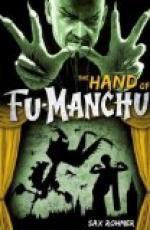“For God’s sake what has happened, Petrie?” he demanded, and began clutching at the lobe of his left ear and looking all about the room dazedly.
“The Flower of Silence!” I said; “some one has been at work in the top corridor.... Heaven knows when, for since we engaged these rooms we have not been much away from them ... the same device as in the case of poor Hale.... You would have tried to brush the thing away ...”
A light of understanding began to dawn in my friend’s eyes. He drew himself stiffly upright, and in a loud, harsh voice uttered the words: “Sakya Muni”—and again: “Sakya Muni.”
“Thank God!” I said shakily. “I was not too late.”
Nayland Smith, with much rattling of glass, poured out two stiff pegs from the decanter. Then—
“Ssh!what’s that?” he whispered.
He stood, tense, listening, his head cast slightly to one side.
A very faint sound of shuffling and tapping was perceptible, coming, as I thought, from the incomplete stairway communicating with the upper corridor.
“The man with the limp!” whispered Smith.
He bounded to the door and actually had one hand upon the bolt, when he turned, and fixed his gaze upon the brass box.
“No!” he snapped; “there are occasions when prudence should rule. Neither of us must leave these rooms to-night!”
CHAPTER V
JOHN KI’S
“What is the meaning of Si-Fan?” asked Detective-sergeant Fletcher.
He stood looking from the window at the prospect below; at the trees bordering the winding embankment; at the ancient monolith which for unnumbered ages had looked across desert sands to the Nile, and now looked down upon another river of many mysteries. The view seemed to absorb his attention. He spoke without turning his head.
Nayland Smith laughed shortly.
“The Si-Fan are the natives of Eastern Tibet,” he replied.
“But the term has some other significance, sir?” said the detective; his words were more of an assertion than a query.
“It has,” replied my friend grimly. “I believe it to be the name, or perhaps the sigil, of an extensive secret society with branches stretching out into every corner of the Orient.”
We were silent for awhile. Inspector Weymouth, who sat in a chair near the window, glanced appreciatively at the back of his subordinate, who still stood looking out. Detective-sergeant Fletcher was one of Scotland Yard’s coming men. He had information of the first importance to communicate, and Nayland Smith had delayed his departure upon an urgent errand in order to meet him.
“Your case to date, Mr. Smith,” continued Fletcher, remaining with hands locked behind him, staring from the window, “reads something like this, I believe: A brass box, locked, contents unknown, has come into your possession. It stands now upon the table there. It was brought from Tibet by a man who evidently thought that it had something to do with the Si-Fan. He is dead, possibly by the agency of members of this group. No arrests have been made. You know that there are people here in London who are anxious to regain the box. You have theories respecting the identity of some of them, but there are practically no facts.”




